Tibetan Shaman Silver Teeth Seeds Stone Talismans Necklace Bohemian A neighbor purchased this on her honeymoon in the 1970's. Was told it was for "good luck". She was still married 40 years later, so who knows!Shells, coins, beads, nuts, teeth, seeds, on this necklace, just about everything.
Teeth in Carms
BABIES CRY A LOT when they're teething. The ancient Roman remedy was the wearing of teeth, which would — according to the laws of sympathetic magic, which uses a related object — ease painful symptoms. The best teeth were those from strong animals like a wolf, dog or horse. (Strong teeth beget strong teeth.) An adult toothache could also benefit from the soothing power of wearing a tooth as a charm. The demand for animal teeth was so great that artificial teeth were sometimes created using bones.
Fast forward to the 18th century and onward. Bavarian men wear animal teeth (and sometimes fur, bones, claws, antlers or quills) on their lederhosen as amulets to ensure a successful hunt. Set in silver, these trophies were passed down for generations within families and were not available for purchase. Much like sympathetic magic, the charms gave the wearer the attributes of the animal whose teeth and other parts adorn the Charivari. Most dynamic: the hinged jaws of a wild weasel, which could open and close in a tiny, fierce snarl.
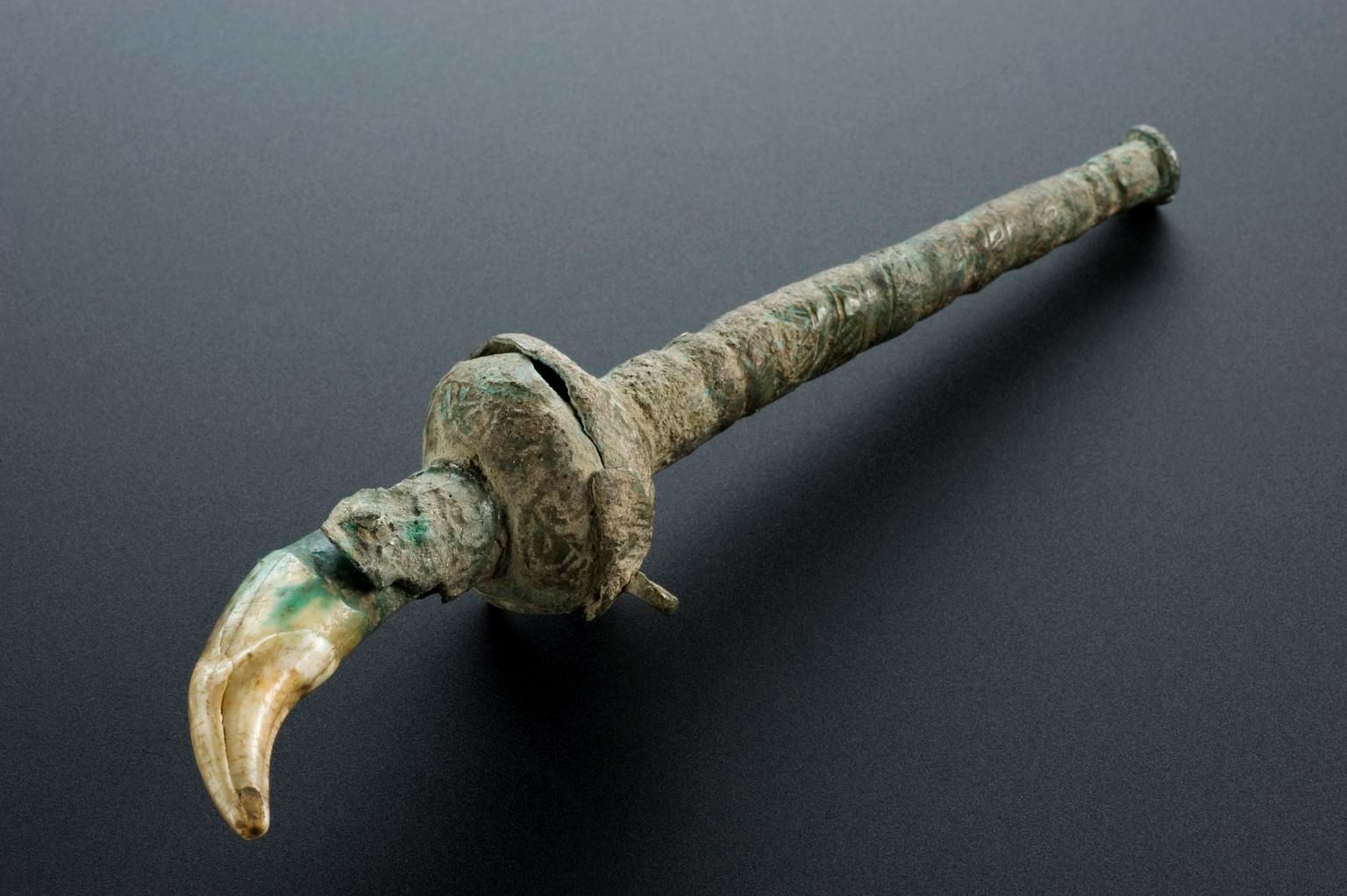
Roman teething charm set in bronze handle. To get its full amuletic benefit, the tooth should be placed on the body, but never touch the floor. Science Museum Group.
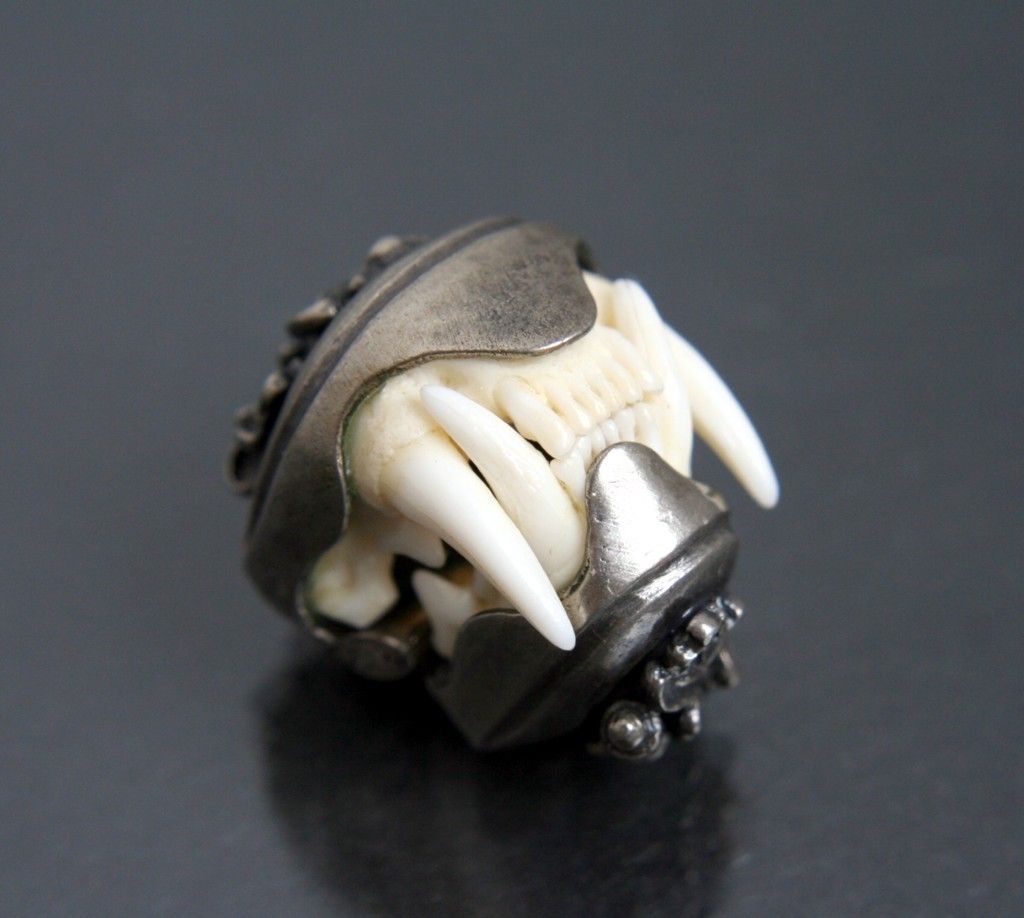
Late 19th or early 20th c Charivari charm: marten (wild weasel) jaws and teeth
Tiger tooth amulet

Teeth & claws amulet charm bracelet

Chinese boars teeth amulet charms.

NZ Wild pig tusk necklace amulet
Shark teeth amulets
An early 18th century amuletic pendant of a fossilised shark-tooth set in an engraved silver mount. When fossilised shark teeth were first discovered embedded in rocks on the island of Malta, their origin was a mystery. The Roman naturalist and author Pliny the Elder (AD 23–79) suggested the curious triangular objects were meteorites that rained from the sky during lunar eclipses, whilst in the Middle Ages people believed they were the tongues of serpents which had been turned to stone by Saint Paul. The teeth were highly valued amulets. All the royal courts in Europe used shark-teeth as amulets to detect poisoned food or drink, as the most common way of eliminating one’s enemy was to poison his food or drink at a banquet. On this pendant the obverse of the silver mount is decoratively engraved and the reverse is engraved with the sacred monogram IHS, a cross above and three nails below it. The pendant is 1 and 2/3 inches long and 3/4 of an inch wide. There are similar examples in the British Museum and a number of European museums.
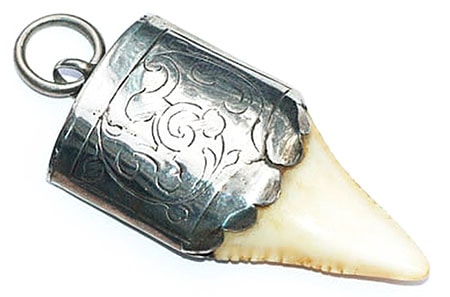
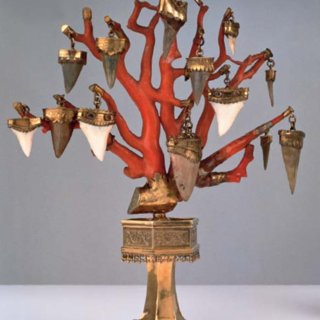
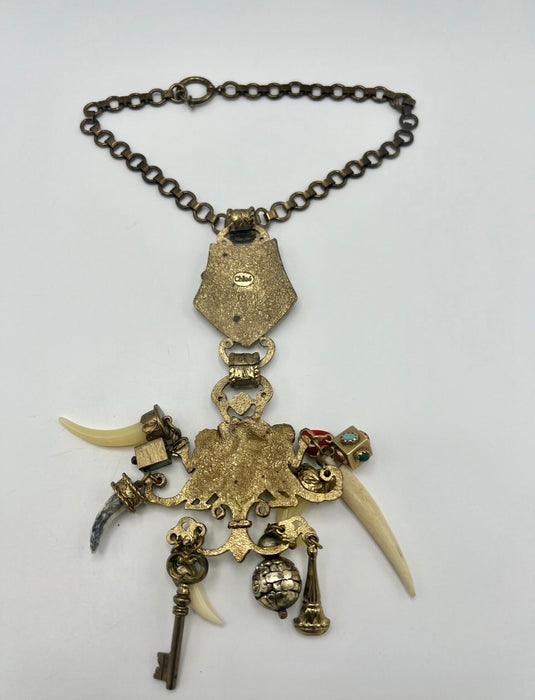
chatelaine belt talismen with monkey teeth

Ancient DNA extracted from a deer tooth pendant has revealed that the age-old jewelry was worn by a single female owner between 19,000 and 25,000 years ago. Found in the famous Denisova Cave in Russia, the trinket belonged to a woman with strong genetic ties to a group of humans that lived further east in Siberia.
Stone Age artifacts hold vital secrets about ancient societies and are essential to our understanding of how humans lived during prehistory. Unfortunately, though, these items can rarely be linked to specific individuals since they are seldom found alongside actual human remains from the deep past.
To overcome this hurdle, researchers have now developed a technique to extract DNA from skeletal artifacts without damaging them. Describing their work in a new study, the authors explain that items made from teeth or bones are more porous than those crafted from stone, and are therefore more likely to harbor and retain ancient human body fluids.
The non-destructive method involves submerging the items in a sodium phosphate buffer while slowly raising the temperature, allowing DNA trapped within the pores to emerge. “One could say we have created a washing machine for ancient artifacts within our clean laboratory," said study author Elena Essel in a statement.
"By washing the artifacts at temperatures of up to 90°C [194°F], we are able to extract DNA from the wash waters, while keeping the artifacts intact.”
The researchers used their technique to obtain genetic material from a deer tooth pendant that had been discovered in the Denisova Cave in 2019. Famous for harboring evidence of an ancient human species known as the Denisovans, the cave was also home to Neanderthals and modern humans throughout prehistory.
In addition to extracting genetic material from the wapiti deer from which the item was made, the researchers also uncovered traces of the human who made, handled, or wore the pendant. “The amount of human DNA we recovered from the pendant was extraordinary,” said Essel. “Almost as if we had sampled a human tooth.”
Examining the mitochondrial DNA obtained from the artifact, the study authors concluded that most of this genetic material belonged to a single individual. The human and wapiti genomes also allowed the researchers to estimate the age of the pendant without the need for destructive radiocarbon dating.
According to their results, the piece was made and used between 19,000 and 25,000 years ago.
An analysis of the nuclear DNA extracted from the pendant revealed that the ancient owner had a high genetic affinity with modern-day Native Americans. When comparing this material to other ancient genomes, the researchers discovered that the wearer of the pendant was strongly related to a prehistoric human group called the Ancient North Eurasians. Traces of this lineage have previously been found in caves further east in Siberia and dated to between 17,000 and 24,000 years ago.
“In summary, our work highlights that artefacts made from bones or teeth are a previously untapped source of ancient human DNA that can provide insights about the ancestry and biological sex of the individuals who handled, carried or wore these objects in the deep past,” conclude the study authors.
The study is published in Nature.
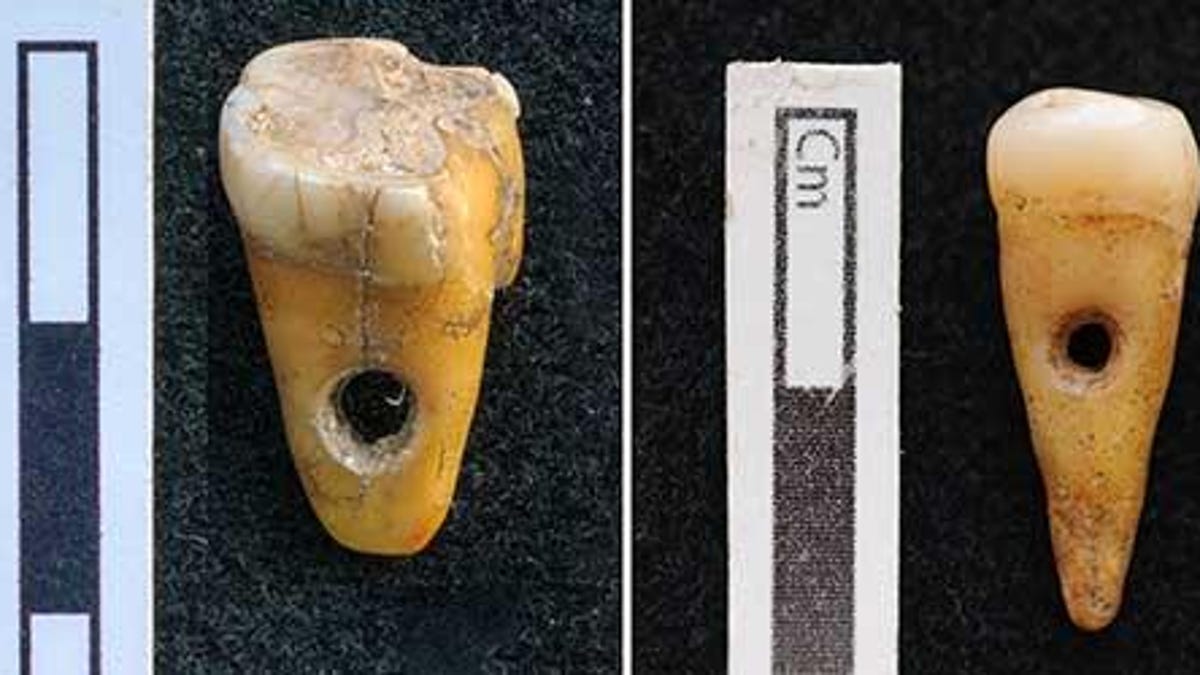
Turkish teeth necklaces from 8,500 years ago hint at ancient rituals
During excavations at a Neolithic site in Turkey, researchers unearthed a rare find, previously undocumented in the near east: three 8,500-year-old teeth, of which two were once used as pendants in a necklace.
The University of Copenhagen scientists detailed the dental discoveries this month in an article in the Journal of Archaeological Sciences.
"What is most interesting is the fact that human teeth and bone were not selected and modified more often. Thus, because of the rarity of the find, we find it very unlikely that these modified human teeth were used solely for aesthetic purposes but rather carried profound symbolic meaning for the people who wore them," the article's author, Scott Haddow, said in a release.
"Perhaps these human teeth pendants were related to specific -- and rare -- ritual taboos? Or perhaps we should look to the identity of the two individuals from whom the teeth were extracted for an explanation?"
While researchers have previously found human teeth used for ornamental purposes at European sites from the Upper Palaeolithic and the Neolithic eras, this find is a surprising one for the region, and it led scientists to dig deeper with macroscopic, microscopic and radiographic analyses. Not only had the two teeth been drilled with a conically shaped microdrill like those used for animal-bone boring, but they also showed signs of daily wear. The teeth are thought to be from humans aged 30 to 50.
Given the small sample size, however, Haddow said the ultimate meaning of the human teeth pendants remains elusive for now.
Replies to This Discussion
-
So fascinating we know so much more about human history than a mere 50 years ago when it was thought history was only 2,000 years old or a bit more. What wonders in discovery! Thanks! P.s. I wish we had a way to audio or listen to the articles since it’s hard to read too much love, Tara
-
-
Sorry bout that you think one page of info is too long a read,...where as its nothing to me,I read way more in books and it is on a social network after all,.. where information is shared to gain knowledge from...I think your also way off in regards to not knowing this info 50 yrs ago too,recording significant events in the history has been written about going way back into the Sumerians in Mesopotamia around 2900 bc (OR POSSIBLY, sightly earlier in Egypt,and it was being spokenabout way further than 2,000yrs even in the 1800's Victorian era,they were writing about archaeological findings & fossils of the dinosaurs etc..but I think I understand where your coming from,yes we investigate further & deeper these days with DNA & technology they didn't have back then years ago...
-
-
I’m not sure what’s going on in the conversation. I am not feeling too great so it’s harder to read sorry if you got the wrong impression . I think that’s happening here is awesome thanks to you
-
© 2025 Created by Tara.
Powered by
![]()